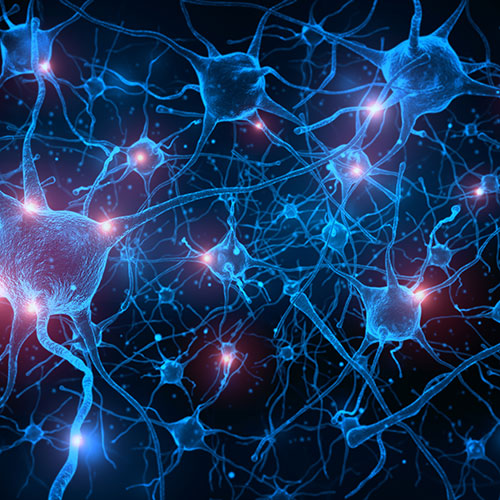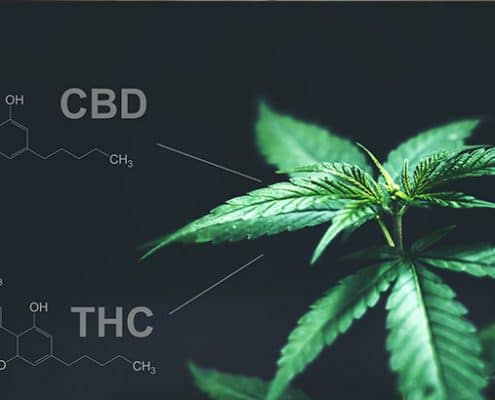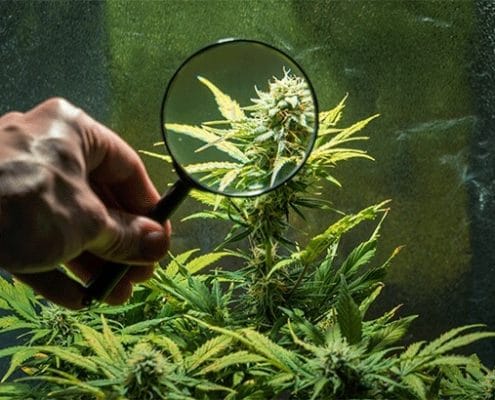Health Effect of
Cannabis on the Brain 3 May, 2021
Health Effect of <br>Cannabis on the Brain

When you take a wide lens look at all of the current research on cannabis and brain health, the results can seem paradoxical. For example, some studies suggest that cannabis can interrupt short-term memory, while others suggest that cannabis actually improves short-term memory. But how is that possible?
There are a few reasons these different studies on cannabis could have such varying results. For example, there’s the fact that marijuana is an extraordinarily complex plant and the fact that seemingly similar studies may actually have very different sample populations or methodologies. There’s also the fact that marijuana can have a biphasic effect, which essentially means that low doses and high doses of cannabinoids can have opposite effects.
When you understand how cannabis works and how each cannabis study was conducted, you can start to see a clearer picture of what cannabis research actually shows. So, what does it show about how marijuana use affects the brain? Find out below as we go over everything we currently know about the health effects of cannabis and the brain.
A Primer on the Endocannabinoid System and the Human Brain

The ECS is a naturally occurring system in the body that’s thought to regulate a variety of physical and cognitive processes, including pain response, certain immune functions, appetite, mood, and memory. The ECS is constantly working to maintain homeostasis within the body in order to keep bodily functions stable and healthy. It does this by producing and breaking down endocannabinoids, which are fat-based neurotransmitters that deliver messages to endocannabinoid receptors all throughout the central nervous system and peripheral nervous system.
Marijuana interacts with the ECS through phytocannabinoids, which are plant-based cannabinoids that are very similar to the body’s natural endocannabinoids. Even if you’ve never heard the terms phytocannabinoid and cannabinoid, you’ve probably heard of the two most prevalent phytocannabinoids in the cannabis plant: delta-9-tetrahydrocannabinol (THC) and cannabidiol (CBD). Plant-based cannabinoids like THC and CBD are similar enough to endocannabinoids to be able to interact with cannabinoid receptors in the ECS. However, THC and CBD are not exactly the same as the body’s own endocannabinoids, so they deliver different messages to ECS neuron receptors, thereby triggering different effects.
Keeping all this information in mind, consider the fact that the brain contains billions of nerve cells, many of which are a part of the ECS. There are two main types of ECS receptors: CB1 and CB2 receptors. Both CB1 and CB2 receptors can be found all over the body, but CB1 receptors are primarily found in brain cells. You’ll find ECS receptors throughout the brain, including in the hippocampus, the orbitofrontal cortex, the basal ganglia, the ventral striatum, amygdala, the brain stem, the spinal cord, the cerebellum, and the neocortex.
Because there are ECS receptors in numerous brain regions, cannabis and cannabinoids can interact with the cells that control many brain functions. So, what does that mean for your brain health? We’ll look at that next.
Research About Cannabis and Brain Function

Cannabis and Memory
The stereotype of the forgetful “stoner” is what comes to mind for many when they think about cannabis and memory. However, marijuana and poor memory don’t necessarily go hand in hand. Though the psychoactive effects of THC may impact short-term memory while a person is intoxicated, there’s no significant evidence that marijuana has a negative impact on long-term memory in fully-grown adults.
It’s true that THC, the cannabinoid in marijuana that causes psychoactive effects, can cause short-term memory impairment during intoxication. Studies have shown that adult cannabis users who are currently under the influence of THC have worse memory recall and more difficulty forming new memories. Yet, studies also show that these memory impairments wear off shortly after the intoxication wears off. Additionally, some studies suggest that frequent marijuana users may actually develop a tolerance to these short-term memory effects.
When it comes to long-term memory and marijuana, there’s not much evidence that THC has a significant effect on long-term memory when used by fully grown adults. When you look at the information about marijuana and memory that’s been published by public health organizations, such as the National Institute on Drug Abuse (NIDA) and the CDC, you’ll see some information on how marijuana use negatively impacts long-term memory in the developing brain— but the key words there are “developing brain.” Marijuana use doesn’t seem to have a significant impact on long-term impact on memory in fully-grown adults, but there are some studies that suggest heavy marijuana use may have a negative effect on people who are still undergoing brain development, such as children, teenagers, and young adults.
There’s mixed evidence that suggests that using marijuana while the brain is still developing could have a negative impact on brain structure development and overall brain function. Some studies show that a heavy, chronic use of marijuana in developing brains increases the risk of certain adverse health effects, including issues with memory, decision making, and attention, and an increased risk of developing cannabis use disorder. Studies also show that younger onset use and heavier use appear to exponentially increase the risk of these issues. Contrastingly, however, there are also studies that show no difference between the brains and neuropsychological outcomes of people who started using marijuana in adolescence and non-users. Additionally, one notable longitudinal study recently found no difference in the IQ of twins when one used marijuana and one abstained.
Cannabis and Cognition
One reason for the discrepancies in cannabis study results is marijuana’s biphasic effect. Marijuana is known to have different effects within a certain therapeutic window than it does at very high doses, so it makes sense that people taking very different doses would feel different effects.
Marijuana’s biphasic effect is particularly noticeable in the studies that have been done on cannabis and cognition. Very heavy cannabis use is associated with worse cognitive performance. However, recent studies have found that medical marijuana may actually improve cognitive function.
One recent longitudinal observational study observed individuals who used medical cannabis for various conditions and symptoms. The study, led by neuroscientist and Harvard Medical School associate professor of psychiatry Dr. Staci Gruber, conducted assessments before individuals started treatment and after three, six, 12, 15, 18, and 24 months. Dr. Gruber and her team found that the participants performed better on cognitive tasks as soon as three months after they started using medical cannabis. Participants showed a particular improvement in cognitive tasks that required executive function, such as problem solving.
Cannabis and Mental Health
According to the current data, cannabis may have a different impact on mental health depending on whether a cannabis user is a full-grown adult or is still developing. Studies suggest that cannabis has benefits for mental health in adults, but that heavy cannabis use during brain development may be detrimental.
Among adults, medical cannabis may be particularly helpful for those experiencing depression or PTSD. A variety of studies have shown that cannabis use in adults may ease symptoms of these disorders. One recent systematic review looked at 31 studies on cannabis and mental health and found that cannabis has been shown to improve the mood of people diagnosed with depression and that cannabis “has potential for the treatment of PTSD.” The review also found that cannabis may have potential for treating substance use disorders.
Though cannabis use may have mental health benefits in fully-grown adults, some studies suggest that it may be detrimental to growing brains. The evidence on this is particularly strong among study populations that began smoking marijuana heavily and regularly before the age of 16. Studies show that heavy, early-onset cannabis use in adolescence is tied to an increased risk of developing certain mental health problems (including depression, schizophrenia, and psychosis) and substance abuse disorders later in life. Note that some scientists have questioned attributing the increased risk found in these studies to marijuana use, arguing that the studies don’t necessarily show that marijuana itself causes these increased risk factors.
Cannabis and Neuroprotection
Some of the most promising cannabis research shows that cannabis may have neuroprotective qualities, which could help people suffering from neurological illnesses. For example, there’s evidence that the potential neuroprotective qualities of cannabis may slow the progression of multiple sclerosis and Alzheimer’s. When considering the combined effects of cannabis and dementia treatments which can include essentials such as memory books, and dementia toys, it is possible that using these interventions together could have complementary benefits.
Some scientists and healthcare professionals have suggested that the potential neuroprotective properties of cannabis could also have positive side effects for people who do not have neurological illnesses. Some studies have shown that cannabis may make the brain more resilient to chronic stress and the cellular effects of aging.
Final Thoughts on the Effects of Marijuana on the Brain
Based on the current research, it seems like medical marijuana use in fully-formed adults may have a positive impact on long-term brain health, while heavy recreational marijuana use in adolescence may have a negative impact. This first point is very promising news for medical marijuana researchers, while the second makes age limits on cannabis seem even more important as more states move forward with legalization.
Though we’re finally starting to get some data on the long-term effects of cannabis on the brain, it’s important to note that none of the current science on the topic is conclusive. The brain is extremely complex and the way marijuana interacts with the endocannabinoid system is extremely complex. And, right now, there are many unanswered questions about how cannabis and the brain interact, so much more research is needed on the topic. While it’s exciting that we’re finally starting to get some research on the long-term effects of cannabis on the brain, we probably have a long way to go before we fully understand how these two immensely complex things interact.
Cannabis on the Brain







